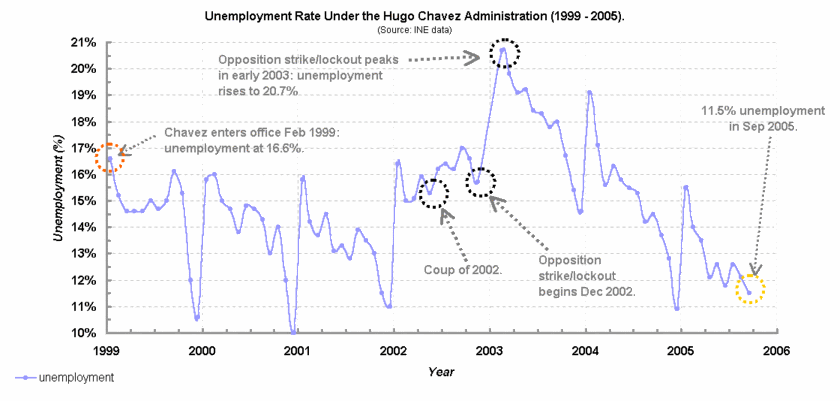Tuesday, June 13, 2006
Unemployment keeps heading down
One day when I have more time and upgrade my internet skills I'll be able to make nice graphs like this:

In the meantime I'm perfectly happy to cadge it from another webiste. Of course, what is really important isn't who made the graph but what it shows.
Looking at the graph we can see that when Chavez came to power unemployment was 16.6%. For the first several years that rate stayed relatively stable in spite of Chavez having inherited a recession from the previous administration. [For those wondering about the dramatic swings every year they result from the numbers not being seasonably adjusted as they are in some countries - these are just raw numbers. Hence unemployment tends to drop significantly in the run up to Christmas and then rise at the beginning of the year as those individuals lose their jobs].
In 2002 as the economy stalled the unemployment rate edged up. The coup of April 2002 aggravated that situation but what really sent the unemployment numbers through the roof as the opposition led oil strike that began in December 2002. With the loss of billions of dollars from the oil industry, the shut down of many private employers and a drop in GDP of over 20% at one point the unemployment rate shot up to almost 21%. Of course, it needs to always be kept in mind this resulted not from a natural economic process or cycle but was largely the result of intentional actions by the opposition.
Since then as the economy has had a dramatic recovery the unemployment rate has steadly trended down. When this graph was done in the Fall of 2005 it was about 11.5% but it is now barely over 10%.
So we have yet another positive macroeconomic indicator to add to the inflation one we looked at previously. In both cases we clearly see how the opposition, with its various attempts to overthrow the government, caused significant damage to the economy. But we then see the dramatic success of the Chavez administration in turning the situation around and making it BETTER than what was Chavez came to office. And that is part of the opposition's problem in the run up to the December elections. Most Venezuelan's will remember who had umemployment at over 16% right before Chavez came to office (Petkoff), who intentionally drove it to over 20% (the opposition), and who has brought it down to 10% (Chavez). No wonder the opposition isn't looking foward to the elections
|

In the meantime I'm perfectly happy to cadge it from another webiste. Of course, what is really important isn't who made the graph but what it shows.
Looking at the graph we can see that when Chavez came to power unemployment was 16.6%. For the first several years that rate stayed relatively stable in spite of Chavez having inherited a recession from the previous administration. [For those wondering about the dramatic swings every year they result from the numbers not being seasonably adjusted as they are in some countries - these are just raw numbers. Hence unemployment tends to drop significantly in the run up to Christmas and then rise at the beginning of the year as those individuals lose their jobs].
In 2002 as the economy stalled the unemployment rate edged up. The coup of April 2002 aggravated that situation but what really sent the unemployment numbers through the roof as the opposition led oil strike that began in December 2002. With the loss of billions of dollars from the oil industry, the shut down of many private employers and a drop in GDP of over 20% at one point the unemployment rate shot up to almost 21%. Of course, it needs to always be kept in mind this resulted not from a natural economic process or cycle but was largely the result of intentional actions by the opposition.
Since then as the economy has had a dramatic recovery the unemployment rate has steadly trended down. When this graph was done in the Fall of 2005 it was about 11.5% but it is now barely over 10%.
So we have yet another positive macroeconomic indicator to add to the inflation one we looked at previously. In both cases we clearly see how the opposition, with its various attempts to overthrow the government, caused significant damage to the economy. But we then see the dramatic success of the Chavez administration in turning the situation around and making it BETTER than what was Chavez came to office. And that is part of the opposition's problem in the run up to the December elections. Most Venezuelan's will remember who had umemployment at over 16% right before Chavez came to office (Petkoff), who intentionally drove it to over 20% (the opposition), and who has brought it down to 10% (Chavez). No wonder the opposition isn't looking foward to the elections
|
